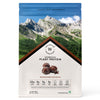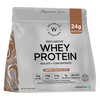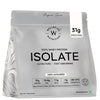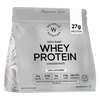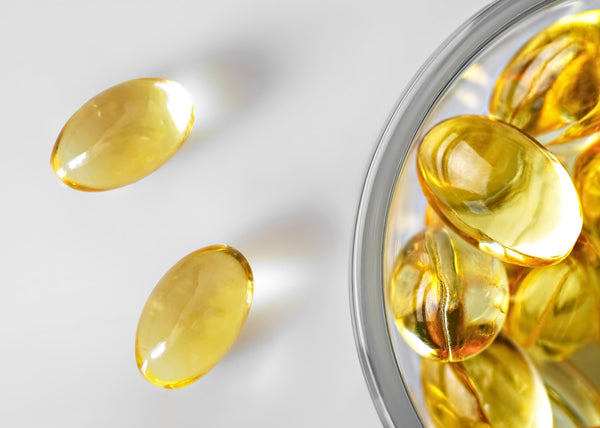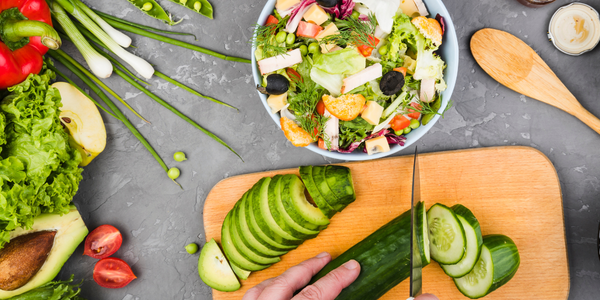Navigating the world of nutrition can often feel overwhelming, especially with the multitude of options available. For women, protein isn't just about building muscle; it’s a crucial component of overall health and wellness. Whether you're looking to enhance your fitness routine, manage weight, or simply nourish your body, understanding how to choose the right protein powder is essential. Let’s unravel this together.
Why Do Women Need Protein Powder?
The significance of protein extends far beyond muscle gain; it’s a vital nutrient that supports various bodily functions essential for women’s health. Here’s a closer look at why protein is crucial and how incorporating protein powder can enhance overall well-being:
Muscle Preservation and Recovery
Adequate protein intake is fundamental for muscle repair and growth, particularly after workouts. It aids in recovery, reducing soreness and enhancing performance in subsequent training sessions [NIH]. For active women, protein powder serves as a convenient solution to meet these increased protein needs.
Hormonal Balance
Protein plays a critical role in hormone production. Key life stages—such as puberty, pregnancy, and menopause—are accompanied by hormonal fluctuations that can impact overall well-being. A sufficient protein intake can help stabilize mood and energy levels during these transitions.
Weight Management
Protein has a unique ability to promote feelings of fullness, curb cravings, and prevent overeating. Research indicates that higher protein diets are linked to greater satiety, supporting effective weight management strategies [NIH]. Protein powder makes it easier to incorporate this macronutrient into your daily routine, helping you maintain a balanced diet.
Immune Function
A robust immune response is crucial for overall health, especially during times of stress or illness. Proteins are essential for production of antibodies and other components of the immune system. By integrating protein powder into your meals or snacks, you can support your immune function while enjoying the convenience it offers.
Support for Active Lifestyles
For those engaging in regular physical activity, protein powders can significantly improve workout performance and recovery. By providing the necessary building blocks for muscle repair, these supplements help athletes bounce back faster, allowing them to stay committed to their fitness goals.
Promoting Healthy Aging
As women age, maintaining muscle mass becomes increasingly important for overall health. Protein powder can ply an importnat role in combating age-related muscle loss, supporting a strong and active lifestyle well into later years. With tailored nutritional benefits—such as added calcium and iron—many protein powders cater specifically to women’s health requirements, ensuring you not only receive protein but also vital nutrients.
Sustained Energy Levels
Incorporating protein powder into your meals can help regulate blood sugar levels, leading to more stable energy throughout the day. By doing so, you may experience fewer energy crashes, allowing for sustained focus and productivity, crucial for managing busy schedules.
Convenience and Customization
For busy women juggling multiple responsibilities, protein powders provide a quick and easy solution to meet daily protein needs. They can be effortlessly blended into smoothies, oatmeal, or baked goods, ensuring nutritious options are always within reach. Additionally, the versatility of protein powders allows for easy customization—whether you prefer a plant-based blend or a dairy option, there’s a protein powder that aligns with your dietary preferences and health goals.
How to Choose Protein Powder for Women?
Finding the right protein powder involves 5 basic considerations:
1. Protein Source
-
Whey Protein: Fast-digesting and rich in essential amino acids, whey protein is an excellent choice for muscle recovery. It’s particularly beneficial when consumed shortly after exercise.
-
Plant-Based Protein: Ideal for those who prefer vegan options, plant-based protein powders offer a combination of nutrients and fiber from sources like pea, hemp, or brown rice.
2. Ingredient Quality
Opt for protein powders that prioritize clean, high-quality ingredients. Look for minimal additives and artificial ingredients, focusing instead on whole-food sources.
3. Dietary Needs
If you have specific dietary restrictions or allergies, make sure your protein powder meets those needs. Gluten-free, dairy-free, and vegan options are widely available.
4. Nutritional Content
Check the nutritional label for protein content, aiming for a powder with at least 15-25 grams of protein per serving. Additionally, seek out powders that contain added vitamins, digestive enzymes, antioxidants, and minerals to enhance nutritional value.
5. Taste and Texture
Choosing a protein powder that you enjoy is key. Experiment with different flavors and brands to find one that suits your palate.
Incorporating Protein into Your Daily Life
Once you've chosen the right protein powder, consider these simple ways to integrate it into your meals:
- Smoothies: Blend your protein powder with fruits, greens, and nut milk of your choice for a nutritious breakfast or post-workout snack.
- Baking: Add protein powder to muffins, pancakes, or energy bars to boost their nutritional content without compromising flavor.
- Soups and Stews: Mix a scoop into soups or stews for added creaminess and nutrition.
- Yogurt or Oatmeal: Stir it into your favorite yogurt or oatmeal for a filling, protein-rich meal.
Protein Sources Beyond Protein Powders
While protein powders offer convenience, whole food sources should also be part of your diet:
- Lean Meats: Chicken and turkey are rich in protein and low in fat.
- Fish: Salmon and tuna provide omega-3 fatty acids along with protein.
- Dairy: Greek yogurt and cottage cheese are protein-packed and great for snacking.
- Legumes: Lentils and chickpeas are excellent plant-based protein sources, rich in fiber.
- Nuts and Seeds: Almonds, chia seeds, and pumpkin seeds not only provide protein but also healthy fats.
In summary, selecting the right protein powder involves understanding your unique nutritional needs and preferences. With the right choice, protein can become a powerful ally in your journey toward better health and wellness. Embrace the variety, enjoy the flavors, and let protein play a vital role in your life supporting your wellbeing
FAQs
1. What are the benefits of protein powder for women?
Protein powder supports muscle recovery, weight management, hormonal balance, and immune function. It helps maintain muscle mass, boosts energy levels, and promotes satiety, making it a valuable addition to a balanced diet.
2. Which is the best protein powder for women?
The best protein powder depends on individual health goals and dietary preferences. Whey protein is ideal for muscle recovery, while plant-based proteins like pea or brown rice are great for those following a vegan diet. Opt for high-quality, clean-label protein powders with added vitamins, minerals, and digestive enzymes for enhanced benefits.
3. Is whey protein good for women?
Yes, whey protein is highly beneficial for women. It is rich in essential amino acids, supports muscle recovery, helps manage weight, and promotes satiety. It is especially useful for those who work out regularly or need a quick and effective source of high-quality protein.
4. How much protein powder should women take daily?
Protein needs vary based on activity levels, age, and health goals. On average, women should aim for 15-25 grams of protein per serving. For active individuals, protein intake should be around 0.8 to 1.2 grams per kilogram of body weight, with protein powder serving as a convenient supplement to whole-food sources.







